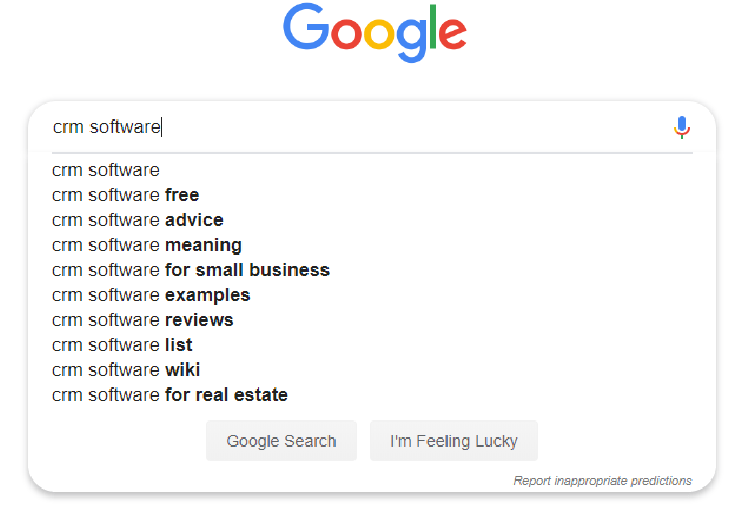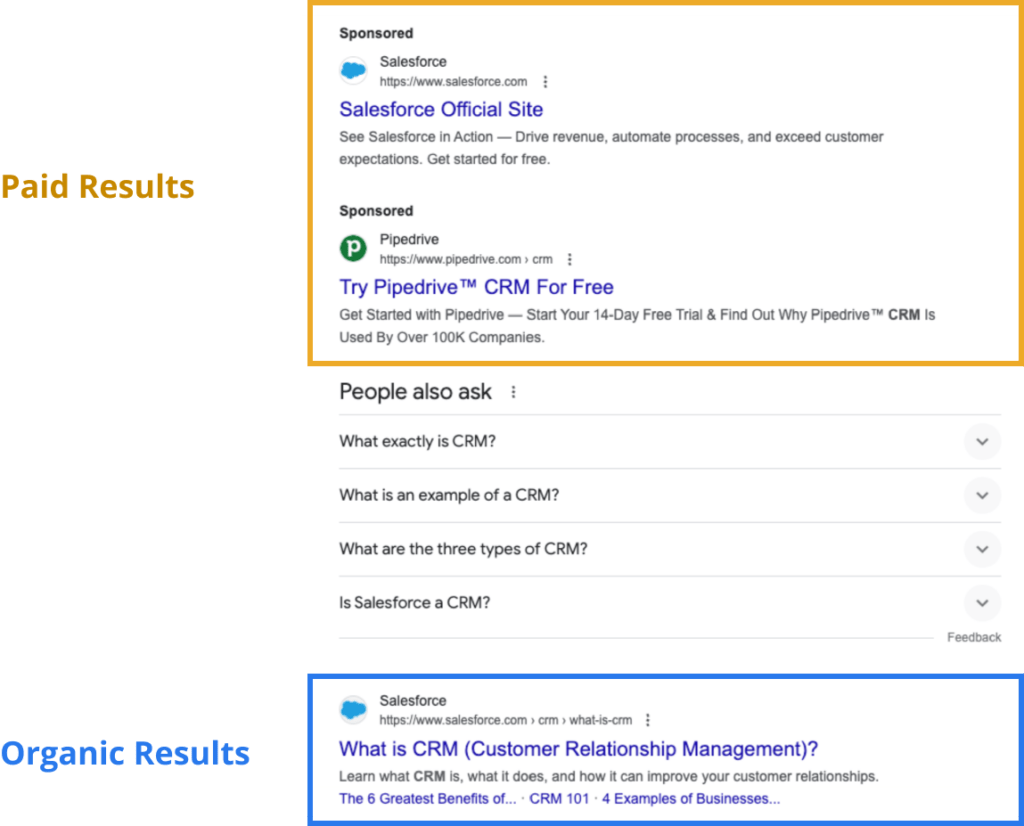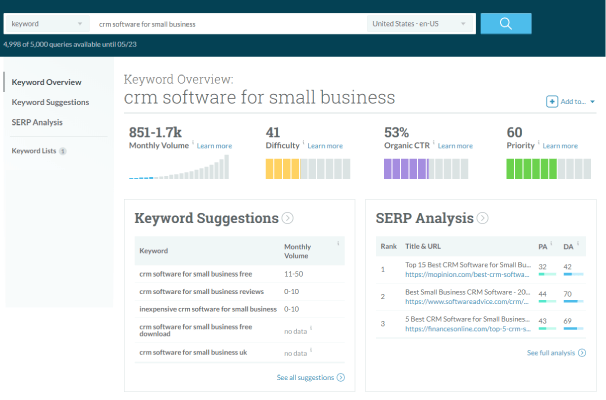How to Do Keyword Research: Tips, Tricks, and Insights


Brent Walrath
This post was originally published in May 2019 and has been updated for accuracy and comprehensiveness.
Whenever a prospect is searching for a solution to answer their pain points, they often open a search browser — like Google or Bing — and start researching. In this chapter, we’ll teach you how to do keyword research to capture your potential customer’s attention.
We’ll break down the keyword research into four distinct phases:
- Understand what makes a strong keyword
- How to use Google to find relevant search keywords
- How to use Moz to determine keyword value
- How to use Semrush to outrank your competition
Before we dive into these four phases, let’s first discuss why every marketer should perform extensive keyword research.

B2B Marketing Strategy Framework: The Ultimate Guide to Business Branding
Learn how to build a strong brand experience with our downloadable guide.
Why are keywords important?
Keywords allow you to help buyers — those who are actively searching for a solution like yours — find you on search engines. Based on your keyword metrics, it can establish a data-driven direction for marketing initiatives. Ultimately, your goal with keywords should be to boost online brand visibility.
When you perform keyword research, keyword research should:
- Tell you exactly which keywords people are actively searching for online
- Help you identify relevant content opportunities that will help you rank higher
- Allow for precise paid ads and organic search engine optimization (SEO) strategies
Now, let’s dive into our four phases of keyword research.
PHASE ONE
Understand what makes a strong keyword
Every experienced content marketer knows that a strong keyword is broken down into this formula:

Search Intent
Search intent signifies why a person made a search and understanding search intent is arguably the most important step in any keyword research.
There are four key categories of search queries:
- Informational: Search inquiries that answer a question or provide a broad overview of a topic
- Navigational: Search inquiries that help users navigate to a specific website or page
- Commercial: Search inquiries that help users decide between two or more competing solutions
- Transactional: Search inquiries that help users purchase a solution
Depending on what kind of content marketing piece you are writing, you’ll be targeting keywords that match the sales funnel. Generally speaking, top-of-the-funnel pieces utilize navigational and informational keywords. On the other hand, bottom-of-the-funnel content typically utilizes transactional and commercial keywords.
Relevant Long-tail Keyword
Long-tail keywords are any search phrases that utilize three or more words. Otherwise, it’s called a “broad keyword.”
While broad keywords have higher search volume, you should avoid solely targeting broad keywords in your content. The issue with relying on broad keywords is that these keywords are competitive and generic; they do not give you a detailed insight into what the searcher is truly looking for.
Example: Let’s say you are looking to market a CRM solution for small businesses.
If you target “CRM” as your top keyword, it will be inefficient as you won’t know why they searched “CRM” in the first place.
For example, a searcher could be looking deeper into
- What “CRM” as an acronym stands for
- How they can implement their own CRM solution
- Understand how to build and code their own CRM tool
Regardless of your hypothesis, you might not be able to attract the right traffic to your site.
On the other hand, targeting “CRM solution for small businesses” allows you to attract the right niche to your site right out of the gate.
Start with a long list of keywords that you believe are related to your product then reverse engineer those search terms, adjusting them through research to better align with how consumers use search engines to find solutions like yours.
After you’ve come up with a great starting point, it’s time to consult the all-time king of search engines: Google.
PHASE TWO
How to use Google for Keyword Research
Start with opening up a guest browser or an incognito window. Since Google relies on your past search queries to determine how to present search results to you, starting with a blank slate will help remove bias from your research.
Then, enter a broad keyword and make a note of Google’s autocomplete results. Once you find a promising keyword, complete your search. Then, look into the “People also ask” section on the search engine results page.
Example: Going back to the CRM example, here’s how our content marketers would research the keyword.
We first take a look at some autocomplete search results.

Then, we hypothesize why someone may be searching for the keyword.
“CRM software meaning” is likely a search performed by someone looking for a definition with little intent on making a purchase soon
“CRM software reviews” is a search likely performed by someone further along in the sales funnel looking for information on specific products in order to make a more informed decision, but the term may not apply directly to your product page
“CRM software for small business” might be a search done by someone in the awareness, consideration, or decision stages looking for CRM software that aligns with their specific needs
Be aware of which results are organic and which are paid ads. Looking into both organic and paid results can help validate your assumptions about search results.

EBQ Tip: This chapter was written primarily from an organic SEO perspective. If you want to get started on paid ads, check out “B2B Google Ads Basics to Help You Get Started with PPC Campaigns.”
After you have a list of promising keywords, let’s narrow down this list using Moz.

Subscribe to EBQ's Bimonthly Newsletter

Subscribe to EBQ's Bimonthly Newsletter
PHASE THREE
How to Use Moz to Determine Keyword Value

In our experience, Moz tends to give straightforward, relevant, and actionable metrics compared to Google’s free Keyword Planner.
Moz reports on the following metrics:
- Search volume: How many times the specific keyword is searched monthly
- Difficulty: How difficult it is to rank higher than competitors for the same keyword
- Organic click-through rate (CTR): Estimates the percentage of clicks available to organic search results compared to other search elements like ads and snippets
- Priority: Combines the other 3 metrics to identify ideal keywords that have high search volumes and CTR with low difficulty to rank
We tend to lend a heavier emphasis to search volume. However, you need to analyze all other metrics to inform your keyword strategy.
To put it into perspective, a keyword might have a high search volume but is nearly impossible to rank for and/or doesn’t provide enough opportunity for actual clicks. On the flip side, you might easily rank for a keyword, but there just isn’t enough search volume to make any impact.
EBQ Tip: We highly recommend tracking all your results in a centralized sheet. That way, you can find keywords that strike the right balance between search volume, CTR, and search intent more easily.
PHASE FOUR
How to use SEMRush to Outrank Your Competitors
Just like any other market analysis, it’s important to keep tabs on your competition.
SEMRush is an industry-leading SEO tool that can help reveal a lot of helpful insights, such as:
- Competitors’ website traffic analytics
- Keywords they rank for
- Pages on competitors’ websites that bring in the most visitors
- Their text and display ads
- Which keywords lead to which of their pages

If you want a more in-depth guide on how to stay search-competitive, check out “SEO Checklist for Blog Posts: Generate Relevant Leads from Content”. We list out a few tips and tricks on how to navigate your on-page SEO.

B2B Marketing Strategy Framework: The Ultimate Guide to Business Branding
Learn how to build a strong brand experience with our downloadable guide.
How to Perform Keyword Research: Summarized
Keywords are important to attracting prospects — who are already actively searching for your solution — to your website. You need relevant long-tail keywords with the right search intent to capture your prospects’ attention.
Thus, your four phases of keyword research are:
- Understand what makes a strong keyword
- How to use Google to find relevant search keywords
- How to use Moz to determine keyword value
- How to use Semrush to outrank your competition
As you may be able to tell, keyword research is a lengthy process. Not every organization has the time or resources to dedicate to their search engine marketing strategy.
That’s why many choose to outsource their content marketing team. Our writers and SEO professionals can help identify high-converting keywords and write content that outranks your competitors. Visit our Content Marketing service page to learn more.
